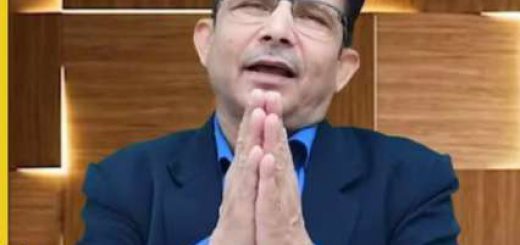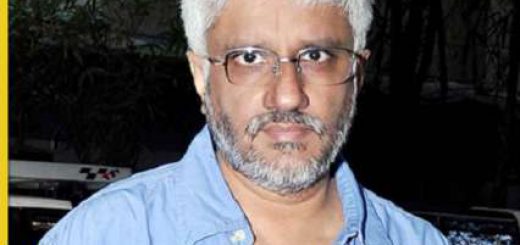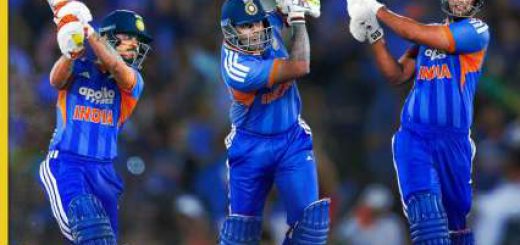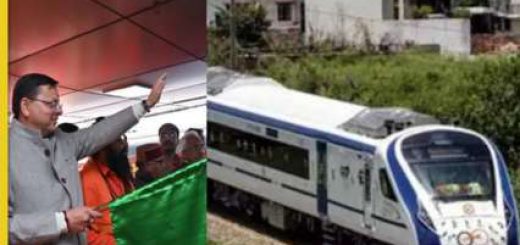Bollywood code cracker – Ayushmann Khurrana
“Vicky Donor was my stepping stone in Bollywood. Before that it was only Shah Rukh Khan who had successfully made the transition from TV to Bollywood,” said Ayushmann.
With rave reviews for his performance as the chauvinistic, under-confident Prem in Dum Laga Ke Haisha pouring in, Ayushmann Khurrana, actor, singer, TV host and now an author is once again on top of his game. The multitalented actor, in an extensive chat with Kanika Rajani talks about his foray into tinsel town, growing pains, Dum Laga Ke Haisha and matters of the heart.
You once mentioned wanting to be a journalist, so could you describe the transition from journalism to TV and then films.
■It’s been a great journey, and I think when you’re not from the industry, you cannot really plan a start or have a launch in the Hindi film industry. You have to take different routes to reach the destination of entering the film industry. I had to pursue theatre, radio, television and then come into films. I think that’s the path other actors who want to join the industry are following, and that’s why you see people making the transition from television to films every year. The trend will continue with people not from the industry.
You wanted to pursue journalism, so was acting ever on your mind?
■ The trivia is, I pursued journalism because Shah Rukh Khan studied Mass Communication (at Jamia Millia University in Delhi). I am a huge Shah Rukh fan, I used to have his posters at my place and I admire him, his intelligence, the way he talks, acts and conducts himself in the industry. He was a youth icon from the late 90s to early 2000’s. Because mass communication is quite vast in its scope, studying it made him more wise and intelligent. I was also making documentaries in my university, but at the back of my mind, I always wanted to be an actor.
When did you know that you wanted to be an actor?
■Since childhood in fact. I saw my grandmother imitating Dev Anand, Raj Kapoor and it was the first time I saw an elderly woman mimicking actors. She would sing in the gurudwara so music and films were integral to my family and we are huge Bollywood fans. But in the early nineties, you could never really confess that you wanted to be an actor. Fortunately times have changed. Parents make that extra effort and enroll their children in theatre and music classes, which never happened earlier. The emphasis was primarily on academics. I’m talking about the nineties when very few students used to participate in extra-curricular activities and I was one of them. I was called a dramebaaz and was the co-captain of the school.
How supportive was your family when you told them of your decision to be an actor?
■ When I was five, I told my grandmother I wanted to act and she slapped me! She retorted, ‘This is not the age to become an actor’. After that I realised, I cannot really speak my mind and it was when I was pursuing journalism that I told my parents of my ambition. In fact they realised it because I was taking theatre more seriously than college or university. I formed two theatre groups in Chandigarh and was actively involved in both street plays and stage plays. I used to compose music and even sing for my own theatre productions. It was a wholesome experience. I think they realised that it was my calling and after journalism, I was sent away to Mumbai.
You decided to audition for Roadies right after you graduated?
■ Roadies happened during the final year of college. In fact, I auditioned for a fiction show titled Kitni Mast Hai Zindagi on MTV and was selected for that show. They were asking me to shift base and come to Mumbai but the amount that they were offering was very meagre. I was like ‘No, I’m in Chandigarh, I can’t really leave everything and come there.’ So they asked me to audition for
Roadies, I entered the final round which took place in Mumbai and was selected. I never intended to join Roadies but I loved travelling and Roadies was very different back in the day. You had to travel from point A to B with some task thrown in and the mind games were not too much then so I eventually won. Although, unlike other reality show contestants who want to shift base immediately after winning on a show, I didn’t do that—my parents didn’t allow me to do that. They told me, ‘Study more. Do more things, do more theatre. You’re not ready to go to Mumbai right now.’ In Chandigarh, I was doing theatre, making documentaries, interning before I left for Mumbai, better prepared to be an actor.
Was it a struggle when you first joined Bollywood?
■ You know I can make it sound very filmi and call it a struggle but I think everything happened organically. If you’re enjoying the journey, you never think of it as a struggle.
Given your unconventional looks, was getting a break difficult?
■ When I came to Mumbai for the first time, I was just distributing my profile, pictures and my CV to everyone. Those days, people used to never mail their pictures, they used to give hard copies of CV’s to casting directors and I very creatively crafted a folder with my pictures and quotes about myself. It took a good one month to draft that portfolio. When I was distributing it I met a certain gentleman by the name Nirupam Sonu. He was the Programming Head of Big FM that time; He used to work at Sony earlier and he asked me if I was interested in radio. In college, I was quite active in public speaking, especially in Hindi and had won lots of debate and public speaking competitions so when Nirupam asked me if I was good in Hindi, I said ‘Of course. I’ve done theatre, public speaking in Hindi and I’ve
studied English Literature.’
He asked me to audition for this radio show, which was going on downstairs. I got selected and was sent to Mudra Institute of Communication in Ahmedabad for training. I thought if I did not become an actor directly, training as a radio jockey would also do. I felt it would only help me evolve as a performer because radio is a live medium, it makes you more spontaneous. I was then sent back to Delhi for two years before returning to Mumbai. I never thought it was a struggle or difficult because I was really enjoying what I was doing.
What drew you to acting?
■ I’ve been acting since childhood. My first play was The Merchant of Venice in 5th standard where I played Shylock and it was followed by Joseph and the Amazing Technicolor Dreamcoat. Acting came naturally to me. One fine day, I knew I wanted to be an actor, I also liked the fact that you get to play different roles. Life would be too mundane if I had a 9 to 5 job! I think acting is exploring yourself even more, observing and taking references from life and portraying it on screen, which is really exciting. You cannot really ask an artiste why they want to paint or write. There’s a natural flair, it’s also habit, I think. You hone your craft over the years, become more comfortable in front of the camera and for me, it happened by dabbling in so many mediums, radio, theatre, television anchoring and presenting, all of which really helped me become a better actor, also.
Can you describe your childhood?
■ I’ve seen a lot of rejections in life since childhood. I was always a nerd. I had braces, was skinny and wore glasses. I was not the tallest guy in class, I was scrawny and I wanted to play Shylock in The Merchant of Venice because I was a good actor and Shylock’s character was really intense. In Joseph and the Amazing Technicolor Dreamcoat, I was one of the brothers. I wanted to play Phaorah, but they wanted a well-built, tall guy and I was short that time. Nobody expected me to be an actor and even now, my batchmates are really surprised that I became a hero. My parents are short and I would pray everyday that my height should at least be 5’10. So when I
suddenly shot up to 5’9 and a half inches after Class 10, I was elated. I was talented, I used to train in classical music as a kid, was a curricular captain of the school and was even a part of the cricket team as well but I was not conventionally good-looking. When you come to a metropolis from a small town, your style changes. I gained weight over the years, started gymming and improved my craft as well. I think eventually your talent, craft and character makes you desirable. If you have that natural connect or chemistry with the audience, whether as an on-screen character or as a presenter, it makes you desirable. I think magic happens when you don’t expect much from life.
Given the film’s plot, did you expect Vicky Donor and Dum Laga Ke Haisha to do so well? What was it like after Vicky Donor’s success?
■We were expecting a lot of critical acclaim for Vicky Donor, for sure, but the kind of commercial success it got surpassed everyone’s expectations. I guess the same thing happened with Dum Laga Ke Haisha, I was expecting critical acclaim as it’s unlike a typical Yash Raj film, without the gloss and the chiffon sarees. It’s as real as it could get. However, the kind of commercial success it’s heading to has
again surprised me. I don’t expect much from life, I like it to surprise me, because that grounds me and makes me happy at the same time.
Of course, life changed after Vicky Donor. I was a known name in television, I had a certain connect with the youth and bagged Vicky Donor because of my stint on TV. But Vicky Donor’s success added more credibility to me as an artiste. It was my stepping stone in Bollywood. Before that, it was only Shah Rukh who had successfully made the transition from TV to Bollywood. And suddenly the
doors were open for a lot of TV actors—I think that was a turning point in my life.
How did you take it when your other films didn’t do as well as Vicky Donor?
■ I thought of it as the curse of a successful first film which set a certain benchmark. It’s a doubleedged sword. Considering Nautanki Saala was made with `10 crore and earned ` 24 crore, it was a success, but yes, Bewakoofiyan and Hawaizaada didn’t do well. Thankfully Dum Laga Ke Haisha did well. I think after Vicky Donor, expectations were high and you can only choose from the films you’ve been offered. Success and failure is not dependent only on you but is the outcome of a team effort. You cannot really predict which film is going to work—you go with your instincts, which may prove to be right or wrong.
Do you ever worry about your shelf life as an actor?
■ Not at all. I’m a laidback person, I’m not ambitious. More than an achiever, I’ve always been an explorer. When I was shooting for DLKH in Rishikesh and Haridwar, I wanted to leave everything in Mumbai and settle down, open a radio station, become a programming head and do a morning show there—that’s my perception of a perfect life. It doesn’t matter if I get roles or not. I think I’ll be happy in my life because I’ve dabbled in so many professions. I love going for concerts and events, meeting people. More than acting, I’m busy with events and other shows. I would love to do theatre and radio, which I’m looking forward to as well.
Is there anything in particular you look out for while saying yes to a role?
■ In these two and a half-three years, I’ve learnt that success is a lousy teacher and failure teaches you a lot. I’ve realised that your intuition is the best thing that could happen. It happened with Vicky Donor and in DLKH, I did not consult anybody before making the choice of my first film and I did not consult anybody before choosing DLKH. I read the script and met Adi Sir (Aditya Chopra) the next day and said, ‘let’s roll this as soon as possible. This is legendary stuff’. I believe that whenever you have the slightest doubt, you should go with your instinct.
But then, isn’t it human nature to think, question and doubt?
■ Of course, you need to jam with the director and go over some things in the script, here and there, but eventually you’ve got to get the feeling that this will be different. Or that it will at least have a connect with people.
How did you bag DKLH?
■ Adi Sir offered me the script and he expected me to refuse it. It happened immediately after Vicky Donor and we were shooting for
Bewakoofiyan. Nautanki Saala had just released then, but when I read the script, I was bowled over. Normally I take my own sweet time, like 2-3 days to read it, but with DLKH I finished reading the script in two hours flat. Next day I met him and I told him I was doing it. He was really proud of the fact that I chose Dum… where the role was not exactly author-backed, and was slightly negative in the first half. My character only becomes slightly likable in the end so it was a challenging role for an actor. I told Adi that I wanted to take up the challenge and that I felt the film would have a good connect with the masses. It connected with me really well, and had lot of quirky
moments too. DLKH was set in the 90s and it had purity of language. The Hindi used in the film is immaculate and it was funny to hear such dialogues in this day and age.
At some level, did you expect it to do well because it’s the story of two underdogs?
■ More than doing well, I thought that it would have a certain connect for sure. Kitna kaam karegi yeh toh we cannot predict, but when I was reading the script it connected with me. Not as an actor who wanted to be a part of the film, but because this is one of those few scripts, which had very well-etched characters. Right from my parents,
Bhumi’s family (in the film);everyone had something quirkiness. So I think it’s the entire ensemble which works in favour of the film. It is also the support cast which really helps to create a certain milieu in the film and I think that really helped in DLKH.
How important do you think physical attraction is in a marriage, at least in the initial stages? Do you think its overrated?
■ Of course, it definitely holds importance. tthat is why the film is so real. The guy was slightly unnerved because, in the film, it is an arranged marriage set-up and he is not in love with this girl. He has his own ambitions or dreams of having a beautiful wife: a thin, conventionally good-looking girl as his wife, but again, Prem discovers Sandhya in the film and discovers that there is a quality which he didn’t possess. He’s an illiterate guy while Sandhya is educated. He probably found certain factors quite attractive about her too, but eventually I think, it’s not only about physical attraction. Initially physical attraction is important initially for sure, but at the end of
the day, it’s the friendship and compatibility that matters forever. You can have that spark in your marriage or relationship, but sometimes you have to create it yourself.
Have you ever dated a chubby girl?
■ No I have not.
Is there any reason why?
■ No, there is no reason, but, in fact, my first crush was a chubby girl.
You’re character is insecure about not knowing English, is there anything you were insecure about while growing up? Could you relate to the character you played in Dum Laga Ke Haisha?
■ I think I was too thin, I was insecure about my looks. As I told you, I had glasses, braces, was not that good-looking, my friends used to get all the attention from girls. I was in an allboys school and just next door was an allgirls school. Everybody used to have a girlfriend,
but no one would give me a second look. Since my mother tongue is Hindi and Punjabi, as a kid I had to struggle with English. I had a complex childhood so I think I can draw that real life reference for sure, which is very important for an actor to draw—it’s the only way you can relate to a character, unless you’re a keen observer. Being born and brought up in Chandigarh, the language was different, for sure, my Hindi had a Punjabi twang to it. I still remember when we had a script reading, I was not getting the accent but we had such an amazing supporting cast, everybody from Sanjay Mishra, Seema Pahwa and Alka Amin got the accent right. I remember director Vibhu Puri had sent Mahesh, (he played my friend in Hawaizaada, the owner of the lingerie shop) to Gujarat while I was shooting for the film as we used to take a lot of time for lighting. During those breaks, I would read scripts with Mahesh and play cricket also. He, in fact, stayed with me in the same guest house. We used to eat together and I would observe him while he spoke, and since I was good at mimicking, I soon caught the accent. I would simply mimic him and got the accent right. Sometimes when you go to UK or the US, you pick up the accent in a month’s time just by talking to the locals there. I think it was so organic when we were interacting with these actors on the sets that we eventually got the khariboli dialect right.
Since yours was not a very likable character in the first half, did you find it challenging to play it?
■ In my head, I was determined to improve myself as an actor and what better way to do so than take up a challenging role? As Adi told
me, the role was challenging and none of my contemporaries could have taken up this character. That’s why I did this and I’m glad people are liking it.
How did you meet your wife Tahira?
■ We’re family friends. We met at Physics tuition. while we were in high school. We’ve been together since the 11th standard and started dating since we were 17. It’s been a good 12- 13 years together.
How did she react to the film and your role?
■ She was the second person to read the script and she loved it. She was expecting this to be a special film and saw it a week before its release. Tahira is really proud that it has turned out so well. She was very impressed by the ensemble cast. Usually critical of my performances, she loved this one.
What was it like working with Bhumi Pednekar, who was a rank newcomer?
■ Bhumi is a natural actor. In fact, she acts like a veteran. She’s been a casting director for six years and I think casting directors are intrinsically good actors. When they try to get the best out of an actor’s audition, they have to give the best cues. And so, having gone through the process, I think she became the perfect actor. She’s acted so well that you cannot tell she’s a first-timer.
What kind of an equation do you share with her?
■ We’re good friends, we party together and have been doing so since the film released. We’re fond of each other. She’s a nice girl, she’s
very cool and the best part is she’s a typical, Mumbai, urbane girl. When I met her for the first time, I never expected her to pull off this
character. She’s worked really hard and even spent a lot of time with Seema Pahwa (who plays her mother in the film).
You’re wife is a professor, right? That also must have helped you to relate to the character?
■ Of course. She’s more intelligent than me. We studied journalism together and she would make my projects while I was busy doing theatre.
How does it feel to be married to someone more intelligent or articulate than you?
■ I think it’s really a turn on. Intelligent women really turn me on. Tahira is the one who’s more intelligent than me, for sure. She’s
more articulate and more organised.The best part is she really respects my simplicity and my talent. Having said that, she was the first one
to know I wanted to be an actor too and initially she was not really happy about it. She comes from a family of academicians, graduates,
wanted to be a journalist, have a simple 9 to 5 job and probably have a more secure life.
Your father is an astrologer, do you believe in destiny?
■Yes, I believe in destiny, for sure. My spellings were changed when I was a kid. It had nothing to do with the industry. I don’t wear any rings, or don’t consult him before making any decisions, but sometimes he guides me. For example, after completing journalism, I was about to take a sabbatical for two-three months and prepare myself to be an actor, but I was thrown out of my place. My father insisted that I go to Mumbai immediately, or else I’d be unemployed for the next two years. I also believe that there’s no wrong time to do the right thing. My father is like a catalyst, he really pushes me a lot. He’s more ambitious than me. I’m a very laidback person, if you’ve
read mythologies, I’m like Arjun. My dad just drives me and propels me whenever required, because I’m very lazy.
Which of your characters did you related to the most?
■ Vicky was the simplest character because that was me. I could even sleepwalk through that character. It was definitely the easiest character for me. For Nautanki Saala, I played a theatre actor, in Agra Ka Daabra, I’m playing a struggling actor (I’ve been one.) It’s easy if you take real life references because again it’s challenging if you’re doing something completely different. DLKH was different, but I took references from the complex childhood I had.
A lot of writers are penning columns. Since you have a journalism background, would you like to do write a column someday?
■Of course, I would love to do that. In fact, I’m writing a column for Men’s Health magazine, I’ve written a book, Cracking the Code How to Survive and Thrive in Bollywood with my wife, Tahira Kashyap and I’d love to write more columns, for sure.
Source:: Indian Express







